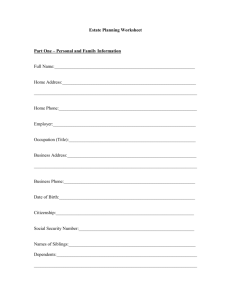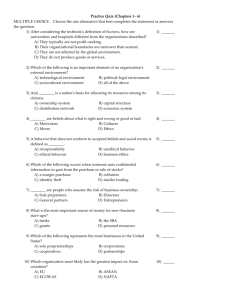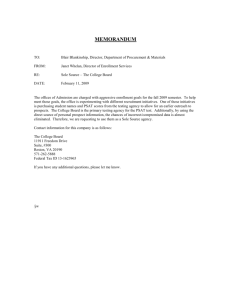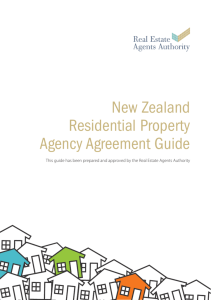Agency Agreements - Real Estate Agents Authority
advertisement
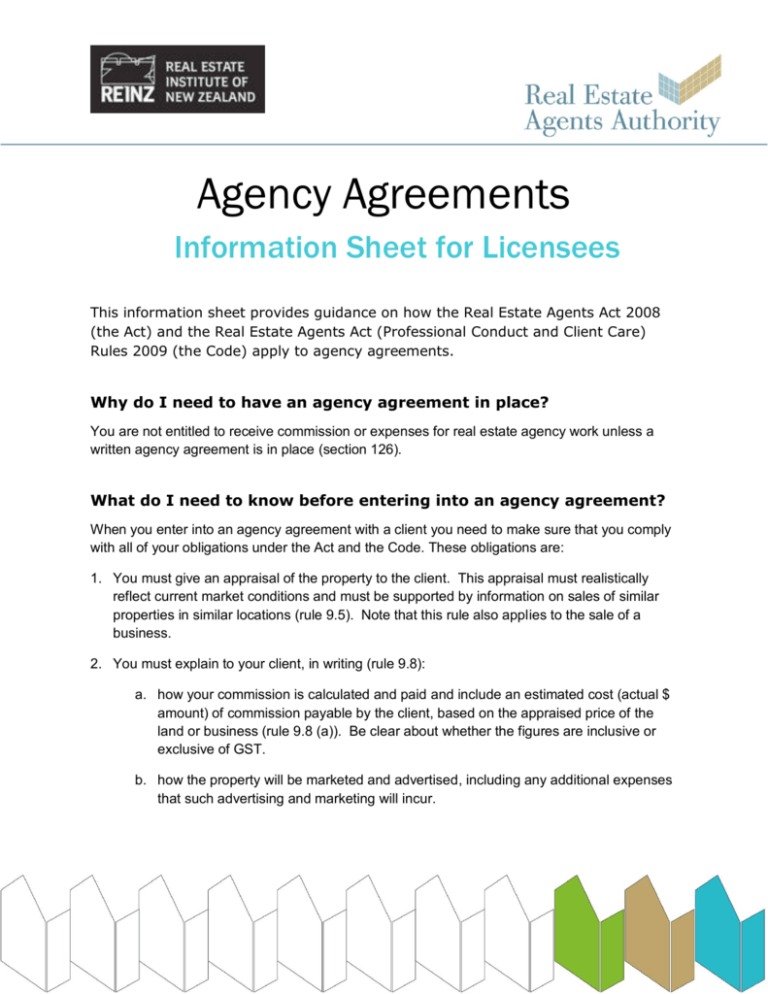
Agency Agreements Information Sheet for Licensees This information sheet provides guidance on how the Real Estate Agents Act 2008 (the Act) and the Real Estate Agents Act (Professional Conduct and Client Care) Rules 2009 (the Code) apply to agency agreements. Why do I need to have an agency agreement in place? You are not entitled to receive commission or expenses for real estate agency work unless a written agency agreement is in place (section 126). What do I need to know before entering into an agency agreement? When you enter into an agency agreement with a client you need to make sure that you comply with all of your obligations under the Act and the Code. These obligations are: 1. You must give an appraisal of the property to the client. This appraisal must realistically reflect current market conditions and must be supported by information on sales of similar properties in similar locations (rule 9.5). Note that this rule also applies to the sale of a business. 2. You must explain to your client, in writing (rule 9.8): a. how your commission is calculated and paid and include an estimated cost (actual $ amount) of commission payable by the client, based on the appraised price of the land or business (rule 9.8 (a)). Be clear about whether the figures are inclusive or exclusive of GST. b. how the property will be marketed and advertised, including any additional expenses that such advertising and marketing will incur. c. that further information on agency agreements and contractual documents is available from the Real Estate Agents Authority (the Authority) tand how to access this information. 3. You must ensure that the client knows they can seek legal, technical or other advice before entering into the agreement (rule 9.9). 4. All material particulars must be included or attached to the agency agreement before you ask the client to sign it (rule 9.10). 5. The agreement must not impose conditions that are not reasonably necessary to protect the interests of the agent (rule 9.12). 6. You must include in every agency agreement a statement about rebates, discounts and commissions (section 128). You must disclose the source of all rebates, discounts or commissions that you and your agency will receive and specify the estimated amount. This statement must be done even if you are not receiving any rebates, discounts or commissions. This statement must be as described in Form 1 of the Duties of Licensees Regulations 2009. You can download this form from the Authority’s website. 7. If you are selling a residential property, you must give the client a copy of the New Zealand Residential Property Agency Agreements Approved Guide before they sign the agency agreement. The client must sign an acknowledgement that they have received this guide (section 127). 8. The agency agreement must be signed by the client, or by someone authorised to sign on the client’s behalf (section 126). 9. A copy of the agency agreement must be given to the client within 48 hours of it being signed by, or on behalf of, the client (section 126). There is an additional requirement for sole agency agreements … 10. You must inform the client that if they enter into or have already entered into other agency agreements, that they could be liable to pay full commission to more than one agent (rule 9.11) What do I need to know about cancelling agency agreements? Sole agency agreements Here are some things you need to know about cancelling sole agency agreements: A client can cancel a sole agency agreement by 5pm on the first working day after they have been given a copy of the agreement (section 130). If the sole agency is for residential property and is for a term of more than 90 days, then you or the client can end the sole agency agreement after 90 days. This applies even if something different is said in the agreement (section 131). If a sole agency is renewed, then the 90 days applies again from the date the agreement was renewed. Cancellation must be done in writing which includes fax or email. You may be entitled to commission after the agreement is cancelled depending on whether or not your work was the effective cause of the sale. What happens once a sole agency agreement is cancelled depends on what the agreement says. Most sole agencies become a general agency when the sole agency is cancelled. This means that if the client no longer wants to continue with the agency that they will also have to cancel the general agency agreement. General agency agreements Most general agency agreements say what the notice period is for cancelling the agreement. The notice period is designed to give the agency the chance to conclude any introductions What is a reasonable notice period for the cancellation of the general agency? There is nothing in the Act or the Code which specifies how long the notice period for the cancellation of a general agency should be. Industry practice is usually somewhere between 7 and 14 days. While there is nothing that prohibits this notice period from being longer, we are of the view that if you try and make it too long you will be at risk of an adverse finding based on the following rules: Rule 6.2: A licensee must act in good faith and deal fairly with all parties engaged in a transaction. Rule 6.3: A licensee must not engage in any conduct likely to bring the industry into disrepute. Rule 9.12: An agent must not impose conditions on a client through an agency agreement that are not reasonably necessary to protect the interests of the agent. Approaching a client with a sole agency with another licensee Previously, under the Real Estate Agents Act 1976, the Rules of the Real Estate Institute of New Zealand (REINZ) prevented you from approaching a client signed up under a sole agency with another licensee. The Act and the Code do not contain any similar provisions. However, this does not mean that anything goes. We recommend that any approach to an exclusive client of another agency be done in a professional and sensitive way and that you: 1. Fully explain the position to the client including their liability to pay two commissions. You need to make sure that the client understands this risk. 2. Ensure that the client has the opportunity to take advice. 3. Do not mislead the client in any way. 4. Comply with all the obligations covered in the Act, the Code and Regulations including having a listing agreement in place and providing an appraisal. 5. Do not mislead potential customers by implying or stating that they cannot approach the sole agent directly. Please remember that any complaint by a client about being put under pressure and/or not being fully informed about their liability to pay double commission could amount to unsatisfactory conduct. This information has been prepared jointly by the Real Estate Agents Authority (the Authority) and the Real Estate Institute of New Zealand (REINZ). This information is a guide only and is not intended to form professional legal advice or legal opinion on any particular matter. Version 1.0 8 March 2012. Real Estate Agents Authority Real Estate Institute of New Zealand PO Box 25371, Wellington, 6146 Phone: 0800 367 732) or (04) 471 8930 Fax: 04 815 8468 Email: info@reaa.govt.nz Website: www.reaa.govt.nz PO Box 5663, Wellesley St, Auckland 1141 Phone: 09 356 1755 Fax: 09 379 8471 Email: reinz@reinz.co.nz Website: www.reinz.co.nz To the best of the Real Estate Agents Authority knowledge, the information in this guide is accurate at the date shown below. However, the requirements on which this information is based can change at any time and the most up-to-date information is available at www.reaa.govt.nz [Version 1.2, 22 March 2012].
